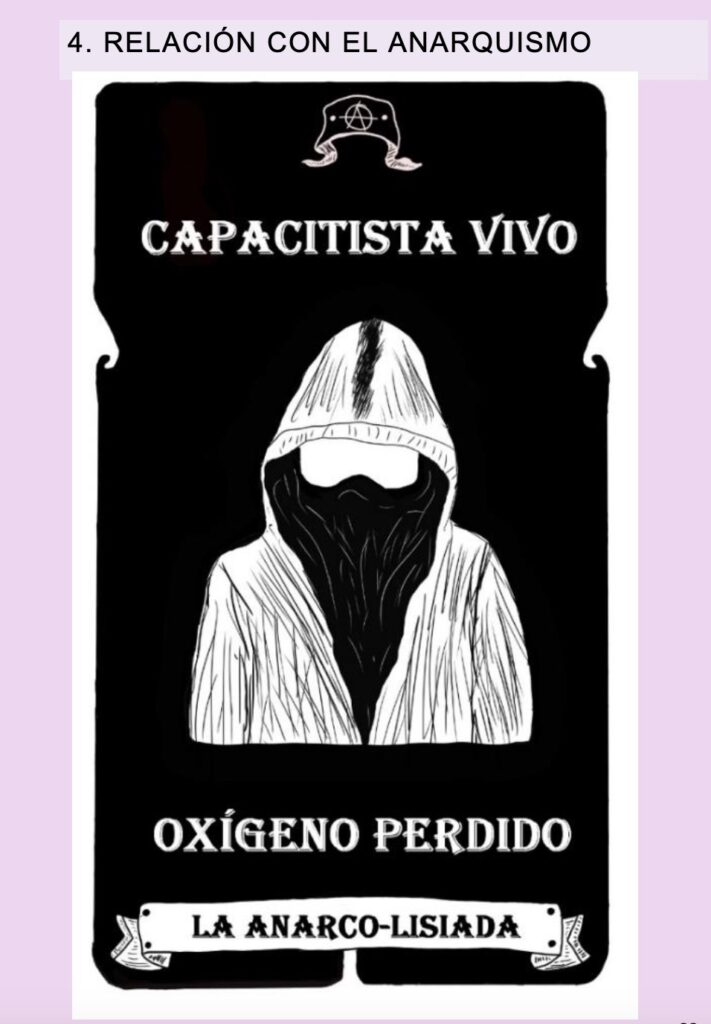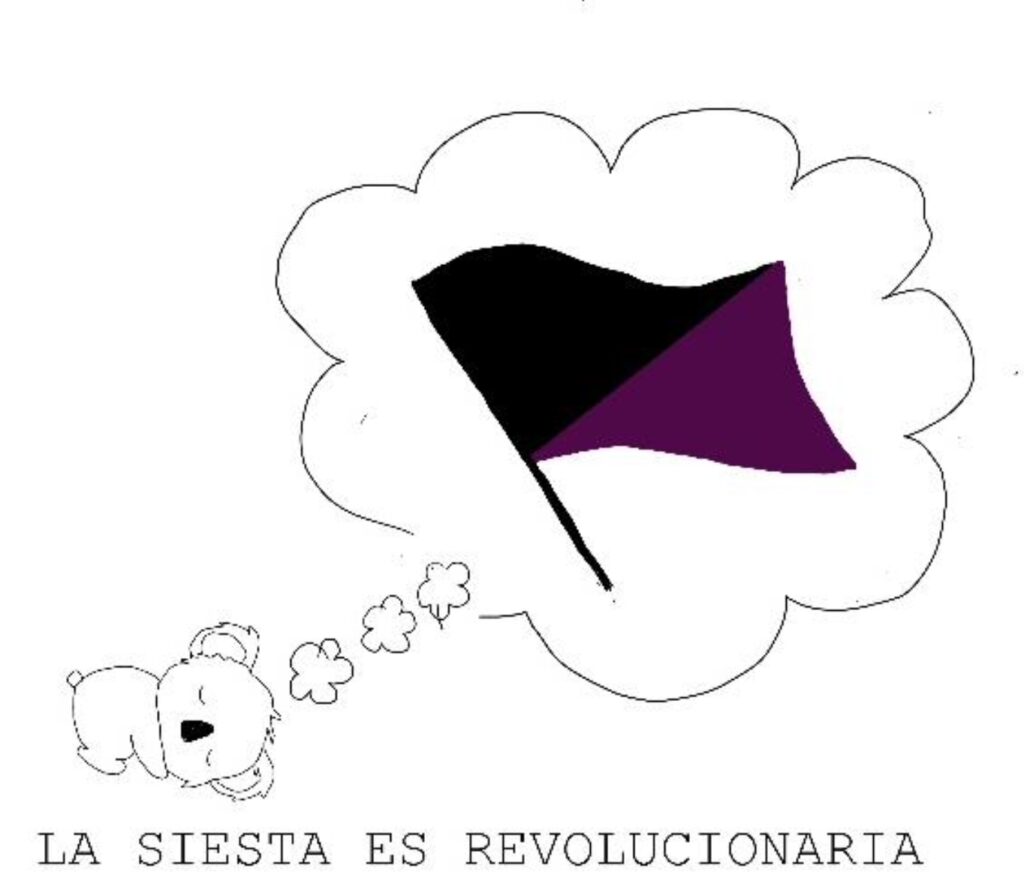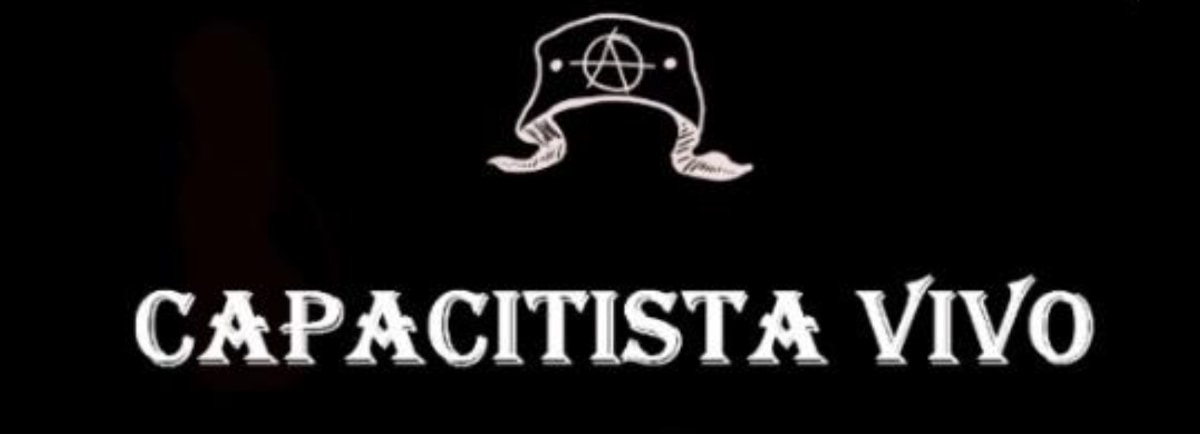This is a translation of chapter 4 of “Lucha contra el capacitismo” by Itxi Guerra. more info bellow *:

The anti-ableist struggle and anarchism are linked because in their analysis of reality there are certain common aspects, such as the desire to abolish wage labor or their stance against ideas of what defines normality. But this has not always been the case.
Anarchism until relatively recently has not been a safe space for disabled people (and it may well still not be safe in environments, where activists perpetuate ableist ideas in discourse and action).
As one [historic] example, during the Spanish Civil War [among the anarchist forces], when comrades were getting wounded in battle (which can be read as them getting disabled), they were sent home to be “taken care of by their wives”, since they were considered to be useless, unable to contribute anything to the struggle (as ableist and sexist as this decision may sound today).
Or even Emma Goldman herself, whom I value so much and who is a reference for so many of us.
She defended the use of contraceptives stating that “if birth control wasn’t promoted by the State, it would be promoting the growth of the destitute, of syphilitics, epileptics, addicts, cripples, sick people, alcoholics” [i can’t find this quote] and she even was in favor of the internment of disabled people because they were a hindrance to society.
But newer approaches to anarchism propose practical solutions against ableism, which makes anarchism one of the movements most involved in the issue.
When the fight against ableism is understood as a clear and real objective, [anarchism] can be seen as a totally compatible movement, since, as was already suggested in the beginning, it aims to destroy wage labor and the State, two of the main forces oppressing “the crippled”.
The State acts as a factor of oppression when it dictates who counts as disabled and who doesn’t, when it institutionalizes disabled people, decides who deserves to receive aid, imposes special education programs or segregation.
By using medicine as its tool to promote eugenics through an ideal of healthy, abled and fit bodies as the only valid body. It promotes forced sterilizations, coercive abortions and abortions of disables fetuses.
In anarchism we not only propose to fight against this type of state violence, but we also promote the idea of collectivizing homework, care and accessibility.
We strife for collective responsibility that will allow everyones needs to be met. Circles of support are one of the [practical] solutions that we propose. These consist of alliances between people (usually two non-disabled people and one disabled person) who are friends and together take care of the accessibility needs of the disabled person.
This idea is a crucial one since this type of care acts horizontally, by considering all the involved parties as active components in the relationship.
It is a relationship of reciprocity, through which both disabled and non-disabled people contribute to each other.
This nuance is important here, this is what differentiates [a circle of care] from personal assistants (PA), a relationship with a PA is always unidirectional.
Wanting to put an end to wage labor facilitates a shift in the conception of what constitutes ability in people and what makes them valuable. By ending wage labor, people will no longer be judged as valid based on their economic benefit, rather people will be considered a valid part of society by virtue of the simple fact of being people.
Most importantly, they will be considered to be political subjects, and not just observers of reality.
With the abolition of wage labor, the idea of utility will be abolished. People will no longer be forced to be productive, will instead do what they can, and want, without the fear of being judged nor feeling guilty about it.
Some of the solutions proposed by anarchists to put an end to ableism:
· Giving disabled people an active role, while ableist society has tried to silence them through confinement and historical erasure.
· Building an anarchist, critical model of disability and neurodivergence, one that enables us to strip them of all the stigma and stereotype that they currently carry.
· Analyzing the work of disabled activists and researchers.
· Speaking in a simple, easily understandable way, just like Malatesta or Emma Goldman always did, and valuing graphic novels as sources of information, as for instance V like Vendetta or Persepolis demonstrate.
· Making our talks, conferences (workshops, meetings), writings and actions accessible to all.
· Creating anarchist anti-ableist [teaching] materials and a radical pedagogy that allows us to deconstruct ableism [at its root].
· Building crisis houses and self-care groups, valuing self-care.
· Understanding mutual aid as the basis of interpersonal relationships.
· Valuing rest and naps. Naps are revolutionary, since they allow us to rest from all the violence that the system exerts on us.
· By deconstructing non-disabled people.
* This was my (clumsy) translation of chapter 4 of the fantastic zine written by Itxi Guerra. To download the latest version of the Spanish text please visit this website.
After i searched for an English translation, but couldn’t find one, i decided to try and have a go. But i have no doubt a much better job can be done to translate this text, so please feel free to help me here.
If someone is interested to translate the entire zine, i would be up for that as well.
A German translation of this chapter was read in this episode of Anarchie und Cello podcast:
A short personal note, I absolutely loved reading this pamphlet by Itxi Guerra, but it also made me very sad at times, as it shows what could have, not sorry, should have been possible. The vision she expresses here is exactly what i would have hoped for. Sadly, at least in my experience, the pandemic has managed to confuse many anarchists and insurrectionists. To some extent this is understandable, since the state powers were expanded under the guise of fighting COVID. However here in central so-called europe way too many anarchists went down conspiratorial rabbit holes and some of them even joined the anti-vaxer demonstrations (they were also fighting against protective measures like mask wearing). Because of that in their structures they are no protective measures in place against the on-going pandemic. As a consequence anarchist gatherings and groups are not currently safe places for immuno-compromised, chronically ill and certain disabled people. This hurts me personally even more, because it was this pandemic that has disabled me with #LongCOVID, or to be more precise, COVID has made me chronically ill, weakened my immune system, endangered me in regards to further infections, thereby, at least in parts, disabled me, and i have been trying to warn people not to take this risk. To no avail.
I wrote about my (for me) horrible experiences with Anarchy2023 here.
How much i wish for a circle of support, because currently the entire burden of taking care of me falls on my partner and lover. It’s too much.
And please remember, naps are revolutionary.
Edit 21.5.2023: The translation of the entire text is now online: The fight against ableism by Itxi Guerra

